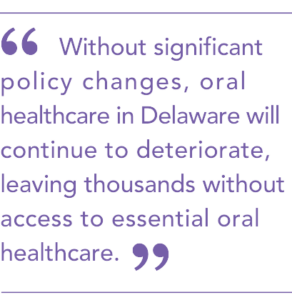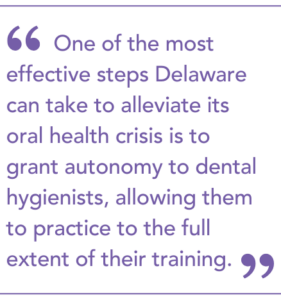by Summer McMenamin, RDH, MS, FADHA
April 3, 2025
Oral health disparities in the United States have never been more apparent. Millions struggle to access preventive care due to barriers in health insurance, Medicaid, and Medicare policies.1 These challenges are not just theoretical – they have tangible consequences for individuals and communities, particularly in states like Delaware, where outdated regulations and workforce shortages further compound the problem. The reality is clear: without significant policy changes, oral healthcare in Delaware will continue to deteriorate, leaving thousands without access to essential oral healthcare.

Recent federal proposals to cut Medicaid funding and impose work requirements threaten to reduce already limited resources, further restricting preventive care and weakening the vital role of dental hygienists. These policy shifts, if enacted, could disproportionately affect low-income individuals, increasing disparities in oral health and limiting access to services that prevent disease before it becomes severe.2 For a small state like Delaware, the consequences of these changes are highly alarming. With restrictive licensing requirements, a limited scope of practice for dental hygienists, and a growing shortage of providers, Delaware’s oral healthcare system is on the brink of collapse. Addressing these systemic issues is not just a policy consideration, it is a critical public health need that demands immediate attention.
According to the 2023 Dental Care Access Task Force Report, Delaware currently has 400 actively practicing dentists and 839 dental hygienists, translating to 44.3 dental providers per 100,000 residents, a figure that falls far below the threshold for adequate care. The closure of public health dental clinics in 2020 exacerbated this crisis, stripping thousands of residents’ ability to access essential preventive services. Despite the 2019 expansion of adult Medicaid dental benefits, many individuals remain unable to use their coverage due to a lack of providers willing to accept Medicaid.3 This discrepancy highlights a fundamental flaw in Delaware’s Medicaid expansion-coverage alone does not ensure access to care. Without increasing the number of participating providers, the expansion remains an empty promise for those who need it most.
Beyond workforce shortages, Delaware’s outdated policies create significant barriers to expanding oral healthcare access. Unlike any other state, Delaware mandates that dentists and dental hygienists take a state-specific, live patient board exam, preventing highly qualified professionals from other states from practicing here without unnecessary hurdles. This restrictive requirement further limits the available workforce at a time when access to care is already critically low. Additionally, Delaware is the only state in the nation that does not permit dental hygienists to administer local anesthesia, a function that is standard practice elsewhere.4
This restriction not only creates inefficiencies within dental offices but also increases patient discomfort and delays care for those needing routine procedures. Allowing hygienists to administer anesthesia would improve efficiency, enhance patient experiences, and expand access to preventive care-especially in settings where dentists are in short supply. Without significant reforms, these antiquated regulations will continue to hinder progress, further widening the gap between those who receive timely care and those who suffer from dental disease.

One of the most effective steps Delaware can take to alleviate its oral health crisis is to grant autonomy to dental hygienists, allowing them to practice to the full extent of their training. Currently, 43 states allow for direct access to a dental hygienist, meaning hygienists can initiate treatment based on their assessment of a patient’s needs without requiring prior authorization from a dentist.4 This policy change has been proven to increase efficiency, improve patient outcomes, and expand access to preventive care-particularly in underserved communities.5
By allowing hygienists to work independently in schools, community health centers, nursing homes, and other public health settings, more residents would receive timely preventive care. This proactive approach would reduce the incidence of untreated dental disease, lower long-term healthcare costs, and relieve pressure on an already overburdened dental workforce. Empowering hygienists is not about replacing dentists, it is about creating a more efficient, patient-centered model of care. When hygienists are allowed to practice independently, dentists can focus on more complex procedures, optimizing workflows and improving overall efficiency in dental practices. With a workforce shortage already straining Delaware’s system, direct access is not just an option-it is a necessity. Without it, thousands of Delawareans will continue to go without basic oral healthcare, increasing their risk of preventable disease and compounding existing health disparities.
Delaware stands at a pivotal moment in oral healthcare policy. If the state continues to resist reopening public dental clinics, it must take bold and assertive action to ensure its residents can still access care. This includes expanding the scope of practice for dental hygienists, reforming restrictive licensing requirements, increasing Medicaid reimbursement rates and reducing administrative burdens surrounding Medicaid, and prioritizing oral health education and preventive initiatives.
The connection between oral and systemic health is undeniable, yet too often overlooked. Poor oral health has been linked to heart disease, diabetes, and other chronic conditions, making access to preventive care an essential public health concern.6 However, expanding access to care is only part of the solution. Delaware must also prioritize oral health education and oral health literacy. When individuals understand the importance of preventive care and develop strong home care habits, they are empowered to take control of their overall health. A well-informed population is a healthier population, and it is the responsibility of policymakers, healthcare providers, and educators to ensure Delawareans have the knowledge they need to make informed decisions about their oral health.
The role of dental hygienists in driving these positive changes cannot be ignored. Antiquated policies must not continue to hold back progress. Delaware cannot afford to lag behind while 43 other states embrace reforms that increase efficiency, expand access, and elevate oral healthcare outcomes. By modernizing regulations, supporting preventive initiatives, and empowering its dental workforce, Delaware can break free from outdated limitations and create a future where oral healthcare is accessible, equitable and effective for all. The choice is clear—Delaware must embrace change, not resist it.
____________________________________
References:
1CareQuest Institute for Oral Health, “Uninsured and In Need: 68.5 Million Lack Dental Insurance, More May Be Coming,” CareQuest Institute for Oral Health, 2023, https://www.carequest.org/resource-library/uninsured-and-need
2Center on Budget and Policy Priorities, “2025 Budget Stakes: Millions Could Lose Health Coverage or See Costs Rise,” Center on Budget and Policy Priorities, January 30, 2025, https://www.cbpp.org/research/health/2025-budget-stakes-millions-could-lose-health-coverage-or-see-costs-rise
3Delaware Dental Care Access Task Force, “2023 Final Report,” 2023.
4American Dental Hygienists’ Association, “Direct Access Chart,” American Dental Hygienists’ Association, February 2025, https://www.adha.org/wp-content/uploads/2025/02/ADHA-Direct-Access-Chart-02-2025.pdf
5Marvellous A. Akinlotan, Alva O. Ferdinand, Hannah L. Maxey, Jane N. Bolin, and Michael A. Morrisey, “Dental Hygienists’ Scope of Practice Regulations and Preventable Non-Traumatic Dental Emergency Department Visits: A Cross-Sectional Study of 10 U.S. States,” Community Dentistry and Oral Epidemiology 51 (2023): 274-282, https://www.adha.org/wp-content/uploads/2025/02/ADHA-Direct-Access-Chart-02-2025.pdf
6Nicholas R. Conte, “A Public Health Update,” Delaware Journal of Public Health 9, no. 1 (2023): 8-12, https://https://doi.org/10.32481/djph.2023.04.004
____________________________________
 Summer McMenamin, RDH, MS, FADHA is a dedicated dental hygienist and advocate committed to expanding access to oral healthcare. With extensive clinical experience in both private practice and public health settings, she has worked to bridge gaps in underserved communities through education, outreach and policy advocacy. Passionate about elevating the role of dental hygienists, Summer actively engages in efforts to promote legislative advancements, interdisciplinary collaboration and increased access to care for vulnerable populations.
Summer McMenamin, RDH, MS, FADHA is a dedicated dental hygienist and advocate committed to expanding access to oral healthcare. With extensive clinical experience in both private practice and public health settings, she has worked to bridge gaps in underserved communities through education, outreach and policy advocacy. Passionate about elevating the role of dental hygienists, Summer actively engages in efforts to promote legislative advancements, interdisciplinary collaboration and increased access to care for vulnerable populations.

